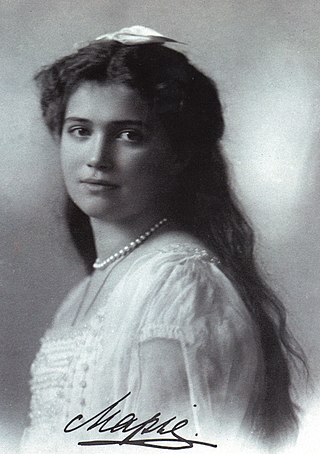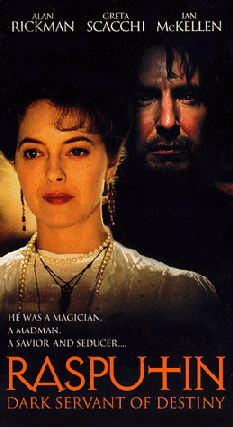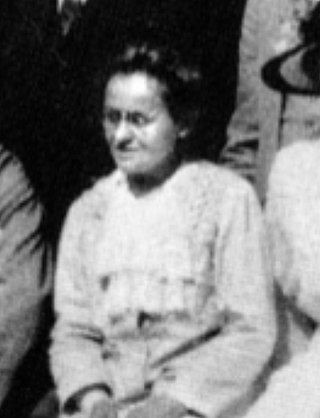
Grigori Yefimovich Rasputin was a Russian mystic and faith healer. He is best known for having befriended the imperial family of Nicholas II, the last Emperor of Russia, through whom he gained considerable influence in the final years of the Russian Empire.

Alexandra Feodorovna, born Princess Alix of Hesse and by Rhine, was the last Empress of Russia as the consort of Tsar Nicholas II from their marriage on 26 November [O.S. 14 November] 1894 until his forced abdication on 15 March [O.S. 2 March] 1917. A granddaughter of Queen Victoria, Alexandra was one of the most famous royal carriers of hemophilia and passed the condition to her son, Alexei Nikolaevich, Tsarevich of Russia.

Grand Duchess Tatiana Nikolaevna of Russia was the second daughter of Tsar Nicholas II, the last monarch of Russia, and of Tsarina Alexandra. She was born at Peterhof Palace, near Saint Petersburg.

Grand Duchess Anastasia Nikolaevna of Russia was the youngest daughter of Tsar Nicholas II, the last sovereign of Imperial Russia, and his wife, Tsarina Alexandra Feodorovna.

Alexei Nikolaevich was the last Tsesarevich. He was the youngest child and only son of Tsar Nicholas II and Tsarina Alexandra Feodorovna. He was born with haemophilia, which his parents tried treating with the methods of peasant faith healer Grigori Rasputin.

Anna Alexandrovna Vyrubova was a lady-in-waiting in the late Russian Empire, the best friend and confidante of Empress Alexandra Fyodorovna.

Grand Duchess Maria Nikolaevna of Russia was the third daughter of Tsar Nicholas II of Russia and Tsarina Alexandra Feodorovna. Her murder following the Russian Revolution of 1917 resulted in her canonization as a passion bearer by the Russian Orthodox Church.

Yakov Mikhailovich Yurovsky was a Russian Old Bolshevik, communist revolutionary, and Soviet Chekist. Yurovsky was commander of the guard at Ipatiev House during the assassination of the Romanov family on the night of 17 July 1918. He is known as the chief executioner of Emperor Nicholas II of Russia, his family, and four of their servants. Yurovsky was responsible for the distribution of weapons, ordering the family to the cellar room, announcing the execution to the family, and the disposal of the eleven bodies.

Ipatiev House was a merchant's house in Yekaterinburg where the former Emperor Nicholas II of Russia, his family, and members of his household were murdered in July 1918 following the Bolshevik Revolution. Its name is identical to that of the Ipatiev Monastery in Kostroma, from where the Romanovs came to the throne. As an act for the 60th anniversary of the Russian Revolutions, it was demolished in 1977 by orders of the Politburo to the local Soviet government, almost 59 years after the Romanov family murder and 14 years before the dissolution of the Soviet Union itself.

Rasputin: Dark Servant of Destiny is a 1996 biographical historical drama television film which chronicles the last four years (1912–16) of Grigori Rasputin's stint as a healer to Alexei Nikolaevich, Tsarevich of Russia; the heir apparent to the Russian throne as well as the only son of Tsar Nicholas II of Russia and Empress Alexandra Feodorovna; who suffered from hemophilia. The film is narrated in the first person by Alexei.

The Church on Blood in Honour of All Saints Resplendent in the Russian Land is a Russian Orthodox church in Yekaterinburg. Being built on the site of the Ipatiev House where Nicholas II, the last Emperor of Russia, and his family, along with members of the household, were murdered by the Bolsheviks during the Russian Civil War, the church commemorates the Romanov sainthood.

The canonization of the Romanovs was the elevation to sainthood of the last Imperial Family of Russia – Tsar Nicholas II, his wife Tsarina Alexandra, and their five children Olga, Tatiana, Maria, Anastasia, and Alexei – by the Russian Orthodox Church.

Anna Stepanovna Demidova was a lady-in-waiting in the service of Empress Alexandra of Russia. She stayed with the Romanov family when they were arrested, and was executed together with Alexandra and the Romanov family on 17 July 1918.

Ivan Mikhailovich Kharitonov was the Head Cook at the court of Tsar Nicholas II of Russia. He followed the Romanov family into internal exile following the Russian Revolution of 1917 and was murdered with them by the Bolsheviks on 17 July 1918 at Ekaterinburg.

Tatiana Evgenievna Botkina-Melnik (1898–1986) was the daughter of court physician Eugene Botkin, who was killed along with Tsar Nicholas II and his family by the Bolsheviks on July 17, 1918.

The Romanovs: An Imperial Family is a 2000 Russian historical drama film about the last days of Tsar Nicholas II and his family. The Russian title implies both the Imperial Crown of Russia and the crown of thorns associated with martyrs. The film premiered at the 22nd annual Moscow Film Festival. The film was selected as the Russian entry for the Best Foreign Language Film at the 76th Academy Awards, but it didn't make the final shortlist.

The Russian Imperial Romanov family were shot and bayoneted to death by Bolshevik revolutionaries under Yakov Yurovsky on the orders of the Ural Regional Soviet in Yekaterinburg on the night of 16–17 July 1918. Also murdered that night were members of the imperial entourage who had accompanied them: court physician Eugene Botkin; lady-in-waiting Anna Demidova; footman Alexei Trupp; and head cook Ivan Kharitonov. The bodies were taken to the Koptyaki forest, where they were stripped, mutilated with grenades to prevent identification, and buried.

Vladimir Nikolaevich Derevenko (1879–1936) was a Russian Empire and Soviet medical doctor and surgeon who served at the court of Emperor Nicholas II of Russia.

Grand Duchess Olga Nikolaevna of Russia was the eldest child of the last Russian emperor, Nicholas II, and of his wife Alexandra.

Elizaveta Nikolaevna "Liza" Ersberg was a German-Russian parlormaid who served in the Russian Imperial Household. The daughter of a stoker employed by Emperor Alexander III, she was hired by Empress Maria Feodorovna as a parlormaid at the Alexander Palace in 1898. She used her post to obtain a position at court for her friend Anna Demidova, who became a lady-in-waiting to Empress Alexandra Feodorovna.




















